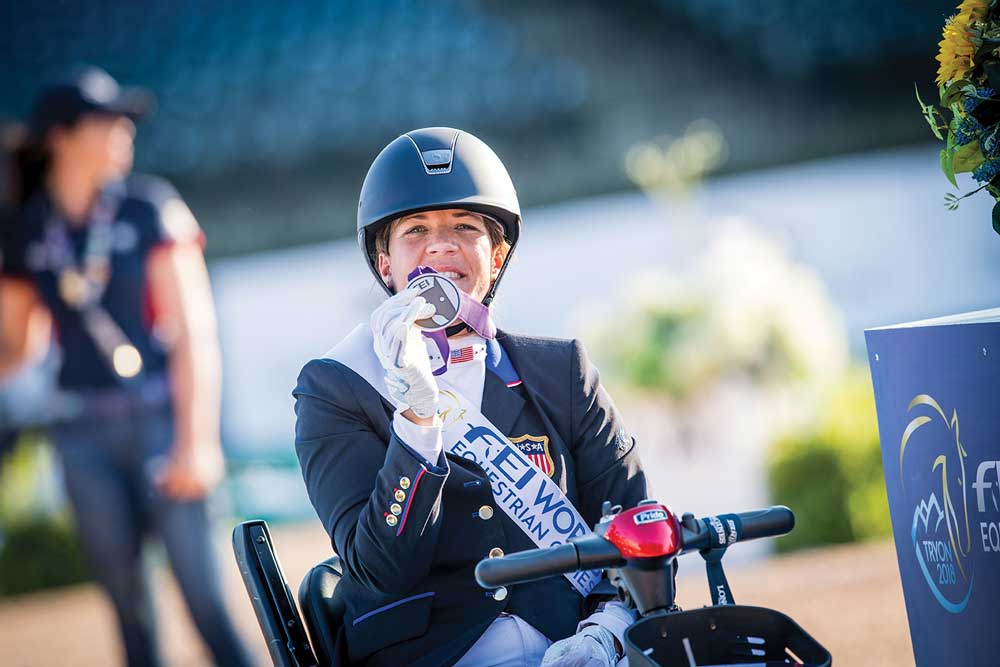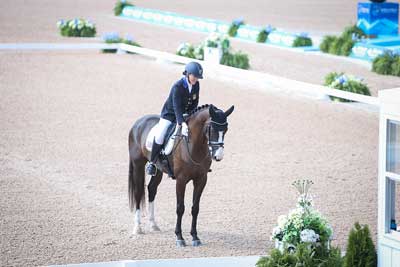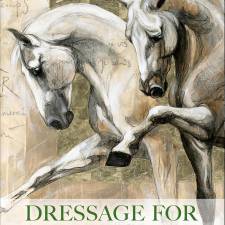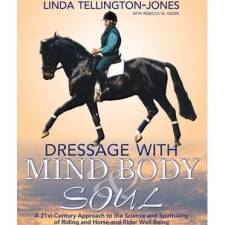
An Excerpt from Riding for the Team from the USET, Edited by Nancy Jaffer
Roxie Trunnell was a competitor in able-bodied dressage who aspired to be an Olympian. When she was a teenager, she created her own business to help purchase her first dressage horse, Nice Touch, known as Touché. She earned a U.S. Dressage Federation Bronze Medal and was close to obtaining her Silver Medal until contracting a virus in 2009 that caused swelling in her brain. She lapsed into a coma and suffered a stroke after a blood clot went to her brain. She now requires a wheelchair to get around for the most part.
Determined to ride Touché again, Roxie had the help of her family and friends to get her back in the saddle. After a long recovery, the native of Washington State slowly began to ride once more and completed her master’s degree in psychology with a focus on equine-assisted psychotherapy.
Roxie is a veteran of the 2014 World Equestrian Games and was tenth individually at the 2016 Paralympics. Her bronze medal at WEG in Tryon, North Carolina, in 2018 was her first medal in a global championship.
Riding has mostly helped me mentally. Prior to becoming a para-equestrian, I would go to school or work and then go ride. This had been the norm for a good chunk of my life. When my friends would go to parties on weekends I would be going to horse shows. After I woke up from the coma, it was very important for me to go out to the barn as much as possible, even if I couldn’t ride, just to feed carrots and cookies to the horses because that felt “normal” to me.
I have an incredibly special bond with my mare Touché. I have owned her since she was eight and rode all the way to Prix St. Georges on her. She is a very spirited redhead who has put me in the dirt more times than I can count. Everybody was nervous about having me get on her again after my illness because she can be rather difficult, but I was stubborn and wanted to ride her. When she saw me sitting in my wheelchair, she bent her knees and leaned over to make it easier for me to get on her back. When I got off-balance in the saddle, she would slow down or do some kind of lateral work to help compensate and let me find my balance again. She recognized I was not the same rider I used to be, and she was going to make it her job to be sure I was safe. I ended up taking her to the 2014 WEG in Normandy, France, where she was the oldest horse there at age 18. But she showed the young horses how it was done by being the best horse on the U.S. para-dressage team.
I promised her there that I would never make her go down another centerline again if she just got me through my first big international show, and she did me so proud. I still ride Touché, even though it’s at a painfully slow walk or slow jog now (she’s 24), but I will always keep her because she has done so much for me. I smile when people say, “Oh, Touché is a nice calm para horse.” She’s a perfect para horse for me, but anyone else she’ll have no problem putting in the dirt. That bond is something that has helped me mentally. I think, “Well, Touché has known me before I got sick and now knows me like this and can accept the changes, so then the rest of the world can just accept me as well.”
That’s not to say riding hasn’t helped me physically, too. With my disability, I have an issue with my balance and coordination. My official diagnosis is cerebellum ataxia. Riding helps keep my core in good working order and having to do very small movements with the reins leads me to really concentrate on what I am doing with my body. I also work out at a gym regularly, and while I’m in the wheelchair 90 percent of the time, I am able to walk with a walker, forearm crutches, or a cane. I focus on my walking several times a week to make sure my legs don’t get weak.

It’s very exciting being part of the highest-placing U.S. para-dressage team at a World Equestrian Games thus far. It was kind of like an underdog feeling in that the other nations haven’t viewed the United States as a “podium threat,” and then we went out there and showed them that we were capable of getting the scores required to get there. I think that might have shocked some nations, while also giving others a hope that if the United States can up its game and put in the work to have success, then they could be capable of doing it as well.
Being part of the team has led me to focus not just on my ride but also on being available to help my teammates with their rides as well. At WEG, even when I had a bad ride on team test day, there were two other riders on the team that I could be there to help have stellar rides. That way, my “bad” ride wouldn’t affect the team as much as it would have if I had just gotten angry and didn’t support my teammates.
Being on a team has led me to ride not just for myself, but also to be more aware that a good or bad ride affects the other riders on my team. I realize it takes a contribution from every rider to get the U.S. team on the podium.
This excerpt from Riding for the Team from the USET and edited by Nancy Jaffer is reprinted with permission from Trafalgar Square Books (www.horseandriderbooks.com).
Find this book and other fascinating reads on our section on Books.


































